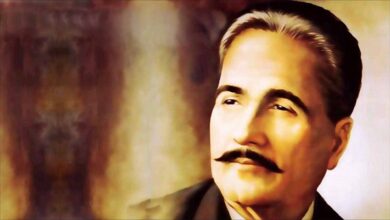UG-PERSIAN, Semester-3, MJC-4, Ques-5
غزل حافظ: “حاصل کارگه کون و مکان این همه نیست“
حافظ شیرازی کی شاعری عارفانہ، فلسفیانہ اور عاشقانہ مضامین کا حسین امتزاج ہے۔ ان کی شاعری میں جہاں ایک طرف انسان کی داخلی کیفیت اور اس کی روحانی جستجو کو بیان کیا گیا ہے، وہیں دوسری طرف زندگی، محبت، دنیا کی فانی نوعیت اور انسان کی حقیقت کے بارے میں عمیق بصیرت بھی موجود ہے۔ حافظ کے ایک مشہور مصرعہ “حاصل کارگه کون و مکان این همه نیست” میں شاعر نے دنیا کی فانی نوعیت اور اس کی حقیقت کو بڑے فلسفیانہ انداز میں بیان کیا ہے۔
اس مضمون میں ہم اس مصرعے کا مفہوم، اس کی تشریح اور حافظ کے کلام میں اس کے مقام کو تفصیل سے جانچیں گے۔
“حاصل کارگه کون و مکان این همه نیست” کا مفہوم:
مصرعہ “حاصل کارگه کون و مکان این همه نیست” کا ترجمہ کیا جائے تو یہ اس طرح ہوگا: “کون و مکان (دنیا و کائنات) کے کارخانے کا حاصل اس سے کہیں کم ہے جتنا نظر آتا ہے۔” اس مصرعے میں حافظ نے دنیا کی حقیقت کو سمجھنے کی کوشش کی ہے۔ “کارگه کون و مکان” سے مراد ہے دنیا اور کائنات کی تمام اشیاء، ان کا نظام اور ان کا مقصد۔ حافظ یہاں یہ بیان کر رہے ہیں کہ جو کچھ ہم اس دنیا میں دیکھتے ہیں، وہ دراصل اس کائنات کا اصل مقصد یا حقیقت نہیں ہے۔ ان کی شاعری میں دنیا کا یہ فانی اور عارضی پہلو بہت نمایاں ہے۔
1. حافظ کی دنیا اور کائنات کی حقیقت کے بارے میں نظریہ:
حافظ کی شاعری میں دنیا کی حقیقت پر گہری بصیرت پائی جاتی ہے۔ ان کے نزدیک دنیا فانی ہے اور انسان یہاں عارضی طور پر آتا ہے۔ وہ اس بات کو تسلیم کرتے ہیں کہ دنیا میں جو کچھ نظر آتا ہے، وہ دراصل ایک عارضی اور جھوٹی حقیقت ہے۔ حافظ نے اپنی شاعری میں متعدد مرتبہ اس حقیقت کا اظہار کیا ہے کہ اس دنیا میں جو چیزیں ہمیں قیمتی اور مستقل معلوم ہوتی ہیں، وہ دراصل وقت کی دھار میں بہہ جاتی ہیں۔
“حاصل کارگه کون و مکان این همه نیست” کا مصرعہ بھی اسی مفہوم کی طرف اشارہ کرتا ہے۔ حافظ یہ بتانے کی کوشش کرتے ہیں کہ اگرچہ ہم دنیا کو ایک وسیع اور شاندار جگہ سمجھتے ہیں، مگر اس کا اصل مقصد یا حاصل کچھ اور ہے۔ یہ دنیا محض ایک عارضی جگہ ہے جہاں انسان کی اصل حقیقت یا مقصد کو دریافت نہیں کیا جا سکتا۔ ان کا مقصد اس بات کو واضح کرنا ہے کہ انسان کو دنیا کی عارضیت کو سمجھنا چاہیے اور اس کی حقیقت کو جاننے کے لیے اس سے آگے کی چیزوں پر غور کرنا چاہیے۔
2. دنیا کی فانی نوعیت اور انسانی زندگی:
حافظ کا خیال ہے کہ دنیا کی حقیقت کو سمجھنے کے لیے انسان کو اپنی فانی نوعیت کو بھی تسلیم کرنا چاہیے۔ انسان جو کچھ بھی دنیا میں حاصل کرتا ہے، وہ آخرکار مٹی میں مل جاتا ہے۔ حافظ نے اپنی شاعری میں اس بات کا ذکر بار بار کیا ہے کہ دنیا کی محبت اور اس کے لذتوں کا پیچھا کرنا انسان کو کبھی بھی سچائی کی طرف نہیں لے جا سکتا۔
“حاصل کارگه کون و مکان این همه نیست” میں حافظ اس بات کو بیان کر رہے ہیں کہ دنیا کا اصل حاصل وہ نہیں ہے جو ہم دیکھتے ہیں۔ اس کا حقیقی مقصد وہ ہے جو ہمیں اس سے آگے جا کر سمجھ آتا ہے۔ اس کائنات کا حقیقی مقصد اور حاصل اس سے کہیں زیادہ عمیق ہے جو ہمیں نظر آتا ہے۔ حافظ کی شاعری میں دنیا کی فانی نوعیت اور اس کے عارضی پہلو پر بار بار زور دیا گیا ہے۔
3. حافظ کی فلسفیانہ شاعری:
حافظ کی شاعری میں ایک خاص فلسفیانہ زاویہ نظر پایا جاتا ہے، جو دنیا کی حقیقت اور انسان کی زندگی کے مقصد کو سمجھنے پر مبنی ہے۔ “حاصل کارگه کون و مکان این همه نیست” کے ذریعے حافظ یہ بتاتے ہیں کہ انسان اگر صرف دنیاوی لذتوں اور چیزوں کی طرف متوجہ رہتا ہے، تو وہ اپنی اصل حقیقت سے بیگانہ رہ جائے گا۔ حافظ کے نزدیک، دنیا کی حقیقت محض ایک پردہ ہے، اور اس کے پیچھے ایک گہری روحانی حقیقت چھپی ہوئی ہے جسے انسان کو دریافت کرنا چاہیے۔
حافظ کی شاعری میں تصوف اور عارفانہ فلسفہ کی جھلکیاں بھی دکھائی دیتی ہیں۔ وہ انسان کو دنیا کی عارضیت کو سمجھنے اور اس کے پیچھے کی حقیقت کو تلاش کرنے کی ترغیب دیتے ہیں۔ حافظ کا خیال ہے کہ دنیا کی ظاہری چمک دمک میں فریب ہے اور انسان کو اپنی حقیقت اور مقصد کو سمجھنے کے لیے اس سے آگے دیکھنا چاہیے۔
4. حافظ کی شاعری میں عیش و نشاط کا مفہوم:
حافظ کی شاعری میں عیش و نشاط کا تصور بھی اہمیت رکھتا ہے، لیکن وہ ان عیشوں کو عارضی اور فانی سمجھتے ہیں۔ حافظ کے نزدیک، انسان کو دنیا کے لذتوں میں محض خوشی اور سکون کا انتظار نہیں کرنا چاہیے، بلکہ اسے اپنی روحانی حقیقت کو دریافت کرنے کی کوشش کرنی چاہیے۔ “حاصل کارگه کون و مکان این همه نیست” میں حافظ یہ بھی کہہ رہے ہیں کہ دنیا میں جو کچھ بھی نظر آتا ہے، وہ صرف ایک عارضی فریب ہے، اور انسان کا اصل مقصد روحانیت اور عشق کی حقیقت کو سمجھنا ہے۔
ان کے نزدیک عیش و نشاط کی اصل حقیقت یہ نہیں ہے کہ انسان دنیاوی لذتوں میں محو ہو کر اپنی زندگی گزارے، بلکہ یہ ہے کہ انسان اپنے روحانی سفر میں اس مقام تک پہنچے جہاں وہ اپنے اصل مقصد کو سمجھ سکے۔ حافظ کا یہی فلسفہ ہمیں اس مصرعے میں بھی نظر آتا ہے کہ دنیا کی حقیقت سے آگے کی کوئی حقیقت ہے جو انسان کو سکون اور اطمینان دیتی ہے۔
5. حافظ کا پیغام اور انسان کا روحانی سفر:
“حاصل کارگه کون و مکان این همه نیست” کے ذریعے حافظ انسان کو ایک گہری روحانی بصیرت دیتے ہیں۔ وہ انسان کو بتاتے ہیں کہ دنیا کی حقیقت کو سمجھنے کے لیے اسے روحانیت کی طرف رجوع کرنا ہوگا۔ حافظ کی شاعری میں ایک پیغام چھپا ہے کہ انسان کا اصل مقصد دنیاوی کامیابیوں اور لذتوں کا پیچھا کرنا نہیں ہے، بلکہ اس کا مقصد اپنی روحانی حقیقت کو سمجھنا ہے۔
یہ مصرعہ ہمیں یہ بھی بتاتا ہے کہ انسان کو دنیا کی عارضیت کو تسلیم کرنا چاہیے اور اس کے پیچھے چھپے ہوئے روحانی مقصد کی طرف قدم بڑھانا چاہیے۔ حافظ کے نزدیک دنیا کے تمام عیش و آرام دراصل ایک فریب ہیں، اور انسان کو اس فریب سے باہر نکل کر اپنی حقیقی حقیقت کو دریافت کرنا چاہیے۔
6. نتیجہ:
“حاصل کارگه کون و مکان این همه نیست” حافظ کی شاعری کا ایک اہم اور گہرا مصرعہ ہے جس میں وہ دنیا کی فانی نوعیت اور اس کی عارضیت کی حقیقت کو بیان کرتے ہیں۔ حافظ اس مصرعے کے ذریعے انسان کو یہ بتانے کی کوشش کرتے ہیں کہ دنیا اور اس کی اشیاء محض ایک پردہ ہیں اور اس کے پیچھے ایک گہری روحانی حقیقت چھپی ہوئی ہے۔ وہ انسان کو اس بات کی ترغیب دیتے ہیں کہ وہ دنیا کی ظاہری چمک دمک کے پیچھے کی حقیقت کو تلاش کرے اور اپنی روحانی حقیقت کو سمجھے۔
حافظ کا پیغام یہ ہے کہ انسان کو دنیا کے عیش و آرام میں محو ہو کر اپنی اصل حقیقت کو نہ بھولنا چاہیے۔ اس کے بجائے اسے اپنی روحانیت کی طرف متوجہ ہونا چاہیے اور دنیا کی عارضیت کو تسلیم کرتے ہوئے اس کے پیچھے چھپے ہوئے مقصد کو دریافت کرنا چاہیے۔ حافظ کی شاعری میں ایک عارفانہ فلسفہ اور گہری بصیرت چھپی ہوئی ہے جو آج بھی انسانوں کے لیے ایک رہنمائی کا ذریعہ ہے۔
Hafez’s Ghazal: “The Outcome of the Workshop of Existence and Space Is Not as Much as It Seems”
Hafez Shirazi’s poetry is a beautiful fusion of mystical, philosophical, and romantic themes. In his poetry, on one hand, he describes the internal state of the human soul and its spiritual quest, and on the other, there is deep insight into life, love, the transient nature of the world, and the essence of human existence. In one of Hafez’s famous verses, “The Outcome of the Workshop of Existence and Space Is Not as Much as It Seems”, the poet expresses the transient nature of the world and its true essence in a deeply philosophical manner.
In this essay, we will explore the meaning of this line, its interpretation, and its place in Hafez’s poetry.
Meaning of “The Outcome of the Workshop of Existence and Space Is Not as Much as It Seems”
The translation of the line “The Outcome of the Workshop of Existence and Space Is Not as Much as It Seems” would be: “The result of the workshop of existence and space (the world and the universe) is much less than it appears.” In this verse, Hafez attempts to understand the true nature of the world. “Workshop of Existence and Space” refers to the entire universe, its system, and its purpose. Here, Hafez is suggesting that what we see in this world is not the true purpose or essence of the universe. In his poetry, the transient and temporary aspect of the world is highly prominent.
1. Hafez’s View on the Reality of the World and the Universe:
Hafez’s poetry offers profound insight into the nature of the world. To him, the world is temporary, and humans come here only for a short time. He acknowledges that what we see in this world is actually a transient and illusory truth. Many times in his poetry, Hafez has expressed that the things we find valuable and permanent in this world ultimately fade away with time.
The line “The Outcome of the Workshop of Existence and Space Is Not as Much as It Seems” points to this very concept. Hafez is telling us that, although we see the world as vast and magnificent, its true purpose or outcome is something else entirely. This world is merely a temporary place where one cannot discover the true essence or purpose of human existence. He intends to highlight that humans must understand the transient nature of the world and seek deeper truths beyond it.
2. The Transience of the World and Human Life:
Hafez believes that to understand the reality of the world, humans must also accept their own transient nature. Everything a person gains in this world eventually turns to dust. Hafez often mentions in his poetry that chasing the pleasures of the world and its loves will never lead one to the truth.
In “The Outcome of the Workshop of Existence and Space Is Not as Much as It Seems”, Hafez emphasizes that the true outcome of the world is not what we see with our eyes. The real purpose is what we can comprehend when we look beyond. The actual outcome of this universe is much more profound than what appears to us. In Hafez’s poetry, the transient nature of the world and its temporary aspects are constantly reiterated.
3. The Philosophical Nature of Hafez’s Poetry:
Hafez’s poetry carries a distinct philosophical perspective, focusing on understanding the reality of the world and the purpose of human life. Through the line “The Outcome of the Workshop of Existence and Space Is Not as Much as It Seems”, Hafez conveys that if a person remains preoccupied with worldly pleasures and things, they will remain ignorant of their true essence. To Hafez, the reality of the world is merely a veil, behind which a deep spiritual truth is hidden, and it is this truth that humans must strive to discover.
Hafez’s poetry also reflects the ideas of Sufism and mystical philosophy. He encourages humans to recognize the transience of the world and search for the truth behind it. To Hafez, there is deception in the world’s outward glitter, and one must look beyond it to understand their true essence and purpose.
4. The Concept of Enjoyment and Pleasure in Hafez’s Poetry:
The concept of enjoyment and pleasure also holds significance in Hafez’s poetry, though he views such pleasures as transient and fleeting. According to Hafez, humans should not wait for happiness and peace in worldly pleasures alone, but rather focus on discovering their spiritual truth. In “The Outcome of the Workshop of Existence and Space Is Not as Much as It Seems”, Hafez suggests that everything visible in this world is just a temporary illusion, and that a person’s true purpose is to understand the reality of spirituality and love.
To him, the true meaning of enjoyment and pleasure is not found in immersing oneself in worldly indulgences but in reaching a spiritual state where one can understand their ultimate purpose. Hafez’s philosophy is evident in this line, emphasizing that there is a deeper truth beyond the apparent reality of the world, which offers peace and contentment.
5. Hafez’s Message and the Spiritual Journey of Humanity:
Through “The Outcome of the Workshop of Existence and Space Is Not as Much as It Seems”, Hafez provides humanity with a deep spiritual insight. He tells humans that to understand the truth of the world, they must turn toward spirituality. In Hafez’s poetry, there is an implicit message that a person’s true purpose is not the pursuit of worldly success and pleasures, but the understanding of their spiritual reality.
This line also implies that humans must accept the transience of the world and take steps towards the hidden spiritual purpose behind it. For Hafez, all worldly pleasures and comforts are essentially illusions, and humans must transcend these illusions to discover their true essence.
6. Conclusion:
“The Outcome of the Workshop of Existence and Space Is Not as Much as It Seems” is a significant and profound line in Hafez’s poetry, in which he speaks about the transient nature of the world and the reality of its impermanence. Through this line, Hafez attempts to tell humanity that the world and its objects are merely a veil, behind which a deeper spiritual truth is hidden. He encourages people to look beyond the world’s superficial glitter and seek the hidden truth and their spiritual essence.
Hafez’s message is that humans should not be immersed in the pleasures of the world and forget their true essence. Instead, they should turn toward spirituality and recognize the transience of the world, while discovering its hidden purpose. Hafez’s poetry is filled with mystical philosophy and deep insight, which continues to serve as a guiding light for humanity today.






